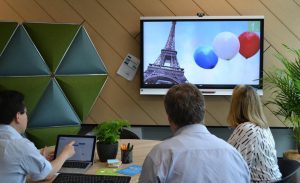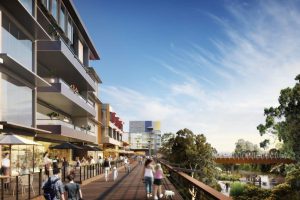- This is the first in our new ‘Spotlight’ series where we profile an innovative local council, the issues they’re facing and the initiatives they’ve developed in response. If you have a suggestion for the next council we should feature, contact us: editorial@governmentnews.com.au
The City of Wyndham in Victoria is pioneering new ways of working and digital transformation as it responds to rapid population growth.
Located on the western edge of Melbourne, between the city and Geelong, Wyndham is a city experiencing massive population growth, which is putting intense pressure on the area’s services and infrastructure.
The city’s young, multicultural population has outgrown Greater Geelong’s for the first time and is now expected to increase by 74 per cent to reach 436,000 by 2036.
In response, the City of Wyndham council has overhauled its organisational and operational structures, pioneered and adopted new ways of working and initiated an agenda of “city shaping” projects.
“Our aim is to be a sector leader, to stretch our organisation’s capacity and push the boundaries of local government by working in partnership with different levels of government and the private sector as we respond to the unique challenges we face as a growth city,” CEO Kelly Grigsby tells Government News.

The city has a diverse population with almost half its residents born overseas and coming from 162 countries, while Ms Grigsby says there’s also a rich and diverse Aboriginal cultural heritage.
It’s also a population experiencing massive growth; 86 babies are born every week in Wyndham which is compounded by strong inward migration.
“It’s hugely challenging when you consider just from a basic service level the sorts of support we need to provide in the community given our young population, which requires services for babies and children,” said Ms Grigsby.
“We’re already heading to the size of the likes of Tasmania and Canberra – cities with significant investment in infrastructure compared to an outer growth area like ours.”
‘Masters of our own destiny’
While councils in growth areas can find themselves consigned to processing approved planning applications from state government, as they watch urban growth boundaries be extended, Ms Grigsby said Wyndham instead sought to adopt a proactive and deliberative “city shaping” approach.
“We wanted to be the masters of our destiny to ensure we don’t let development just occur without also creating community and the right conditions for local economic development,” she said.
Three years ago the council developed its Wyndham 2040 plan to set out a long-term vision for the city and its community, detailing the values and aspirations of residents.
“We developed district plans as part of that. Each of our key suburbs is vastly different so they’re packaged up into planning districts,” said Ms Grigsby.
Organisational overhaul
In line with the city’s new plan, the council undertook an overhaul of its organisational structure and way of working.
“We redesigned the organisation from top to bottom to contemporise the way we work, because the old ways weren’t going to deliver any of the aspirations for the future.
“We had to rethink our capability in terms of staff, skill sets and where we would invest more attention.”

A key outcome of the organisational overhaul was the establishment of a smart city office, which has been rolling out the council’s digital transformation project. This includes a focus on the Internet of Things, how data is being used and ways to digitise the internal council environment.
“We’re really passionate about how we can use technology and data to make the city more accessible for people in terms of entrepreneurial opportunities and economic development.”
An early project for the office was WynLens, a tool that uses augmented reality to help residents envision future developments, which has subsequently won several awards and garnered considerable interest within the sector.
The premise was that blueprints and maps often don’t provide the insight that the community, stakeholders and investors require when considering a new development whereas “mixed reality” could bring abstract and technical ideas to life.
The ability to immerse citizens, staff, politicians and business leaders into a digital environment to explore and understand a city is game changing, Ms Grigsby said.
“We’re spending a lot of time supporting other councils to use the technology. This is where we’ve been leading in terms of that thinking around smart cities. We’re big believers in sharing what we’re learning to enhance and strengthen the sector,” she said.
Stimulating industry, employment
An early deployment for WynLens was in engaging community around the council’s Catalyst project, a joint venture with developers that sees council land leveraged to create a multi-use investment within the Werribee City Centre.
Werribee is one of a number of centres the council is working to transform into vibrant city centres through landmark projects that create local jobs as well as new residential and commercial spaces.

“Currently, many residents leave Wyndham to head to work in the city or other suburbs in the outer metro area, which creates significant congestions issues on our roads, as well as poor lifestyle outcomes given residents are spending so much time in their vehicles,” said Ms Grigsby.
“Liveability is a huge issue for us, which is why we’re focused on the creation of employment so more residents can live and work locally,” she said.
For the council this requires supporting existing industry in the region, such as agriculture, and working with partners to create an environment where new enterprises are nurtured.
“One of the floors will be dedicated to start-ups and a co-working space,” Ms Grigsby said of the new Catalyst project.
More broadly, Ms Grigsby acknowledges that the council will always need to focus on the “core service delivery aspects” of local government, but argues this doesn’t mean it can’t think big.
“Fundamentally, to be the change agents we need to be in our community, to shape the city for the future, we need to think differently about the projects we engage in and the partners we work with,” she said.
Comment below to have your say on this story.
If you have a news story or tip-off, get in touch at editorial@governmentnews.com.au.
Sign up to the Government News newsletter.




Leave a Reply